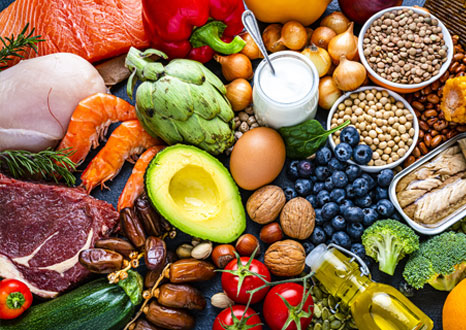Creating a Healthy, Sustainable Relationship with Food
By Cara Tremols
When it comes to nutrition slogans, many might come to mind. Eat your vegetables. You are what you eat. An apple a day keeps the doctor away. Messages like these have likely been ingrained in our thoughts since childhood, but it’s important to take a step back and talk about why nutrition matters and to create our own healthy messages.

For cancer survivors, nutrition is a wonderful way to explore the benefits of food while also giving control back to the survivor.
If you’re not feeling well, you might reach for prepackaged soups or go for the BRAT diet (bananas, rice, applesauce, toast). A cancer diagnosis, depending on whether you’re in active treatment or beyond, requires a more nuanced examination of your nutrition. How can food aid or impede your symptoms? How can you get the most out of each ingredient and meal? These are questions that Sylvester Comprehensive Cancer Center’s registered dietitians can help answer.
After a cancer diagnosis, “our first goal is to get you as healthy as possible for whatever treatment you’re going to have,” said Tracy Crane, Ph.D., RDN, co-leader of the Cancer Control Research Program at Sylvester and associate professor of Medicine in the Division of Medical Oncology. “We try to optimize nutrition prior to treatment. There’s a growing body of evidence for how we can utilize nutrition, food and your diet as part of your care plan, how it can help alleviate symptoms or help you get through all of your scheduled treatments.”
Some symptoms can make eating difficult, but the right nutrition can help mitigate that.
Once treatment is completed, a registered dietitian can help establish a new normal and prevent cancer from coming back.
So, what can you do to improve your own nutrition?
Optimize fruit and vegetable intake. We know this sounds like something you’ve been hearing since you were born, but there’s a reason why. On top of being delicious, especially when enjoyed in season, fruits and vegetables contain phytochemicals that are powerful cancer-fighting agents.
“What you eat is your own contribution to your health,” Dr. Crane said. “Several large-scale, randomized trials demonstrated the benefits of eating healthy after a cancer diagnosis—not only for hopefully preventing cancer from returning, but also other chronic diseases.”
What about diets? Diet fads come and go, Dr. Crane most often recommends the Mediterranean diet (with a few modifications), as it has the most evidence-based research on preventing cancer recurrence.
Avoid removing entire food groups from your diet. Doing so might eliminate certain nutrients and potentially important cancer-fighting food components. “Anytime a diet is asking you to eliminate something, it’s something you should talk to your provider or dietitian about,” Dr. Crane said. “It’s always easier to add than subtract. Let’s talk about adding a vegetable or whole grain serving to your diet.”
Shop the grocery store perimeter. The healthiest items are on the outside aisles. You’ll find your lean protein, whole grains and produce, while more processed foods are stocked in the middle. Better yet, do your shopping outside at a local farmer’s market. Find colorful, in-season produce and also get some fresh air. Bonus for our readers: If you need some help with your shopping list, check out the list created just for cancer survivors by Dr. Crane’s lab in this newsletter.
Arming yourself with these tips will help set a foundation for a lifetime of healthy, but enjoyable eating. After all, nutrition is what you make of it. While registered dietitians may agree with the overall sentiment that food is medicine, perhaps the more important message is that food is the spice of life.
“It’s important for survivors not to forget to enjoy food,” Dr. Crane said. “Eating is a social event, and we want to remember to enjoy cooking and eating with our loved ones. Be as healthy as possible but still enjoy food.”